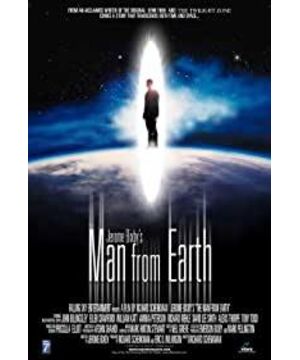As a movie fan, I can't regard "This Man From Earth" as a classic, and I can't even enjoy this movie. As far as the basic elements of film technology are concerned, this film has no bright spots. Most of the time the camera only switches between each character mechanically according to the need of the dialogue; the composition of the picture is not very aesthetic; the soundtrack-if there is any soundtrack-does not play a role in supporting the narrative at all; the rhythm control is also lacking; the actors His acting skills are also generally marked. Of course, as a low-cost "sci-fi" film with conversation content as the main plot, we can temporarily put aside the discussion of film techniques and focus on the story in the film and the worldview that the author promotes. The story of the film unfolds according to a core clue, that is, is there a person in this world who can live all the way from the Paleolithic age for 14,000 years to the present? If such a person really exists, what is his life experience? On this topic, I think a narrative method that can more attract the audience's attention should be logically deduced. When you have to accept an unbelievable point of view due to rigorous reasoning, the psychological resistance and shock are much stronger than just being instilled in that point of view. So if the idea of this film is: the male protagonist John provides facts and clues, and the people around him continue to approach the truth through logical deduction-that is, John is an undead from ancient times. That film may be more attractive. However, the story of the film adopts another idea, that is, the male protagonist John proposes that he is an immortal primitive man shortly after the beginning of the story, and the rest of the film is trying to prove or falsify this fact. This kind of thinking will not make the story fascinating. The reason is that the verification or falsification of the "facts" are all subject to the screenwriter's subjective control, without the participation of the viewer's mind: whether the screenwriter wants John to be a primitive person or not, he can. Provide irrefutable evidence at will; the audience only needs to accept the facts thrown by the screenwriter, without logical reasoning. In fact, it is not difficult for the audience (and the scientists in the movie) to believe that John is immortal. He only needs to provide evidence that he has lived for a hundred years-from the perspective of violating common sense, he is alive. A hundred years (and it always seems to be thirty-five years old) is just as incredible as 10,000 years of life. With the advancement of human science and technology in the past 100 years, photos of this man over the past 100 years and any traces of his life can prove his existence. Just as at the end of the film, John easily reminded one of the professors-we later learned that he was John's son-by recalling the details of his life, to realize that John really does not age. But this ending will not give us any psychological shock. To give an improper analogy, if "Sixth Sense" didn't allow the audience to discover surprising facts at the end (no spoilers here), then the film would not bring such a shock. Haven't we already accepted the fact that John is a primitive man in this film? So what is unexpected about this ending? Therefore, in the development of the whole plot, the audience, like the scientists in the film, accepted John's theory with little difficulty, that is, he is a 14,000-year-old primitive man. The advancement of the film became a medium for John (actually behind the screenwriter) to express his personal opinions on anthropology, biology, history, and religious history. As a science fiction film, the film actually pays more attention to "fantasy" and seldom scientific reasoning. If we follow the logical deduction method since Plato, we can only start from the axiom of “self-evidence” and draw conclusions through rigorous logic; on the contrary, in this film, the screenwriter’s arbitrary addition of “factual evidence” can make this story even better. Consummation, but it has lost its "scientificity." This is also what I think the storyline of the film has lost the source of dramatic tension and conflicts, so that it is difficult for the audience to feel the sense of introduction of the story. This kind of plot also makes the film’s responses to questions about John’s life experience mostly appealed to two types of explanations. The first type is to personalize history and storytelling in order to be more credible; the second type is through and The analogy of ordinary people's experience legitimizes John's behavior. These two types of explanations are also the subjective interpretations of the screenwriter, without any logic at all. Regarding the first type of example, for example, when John just revealed that he was a primitive man, he talked about that he had sailed with Columbus. He said that although he believed that the earth was round, he still feared that Columbus’s ship would be taken from the earth somewhere. The edge fell off. Another example is that someone later asked him if he had left cave paintings. He told a story about Les Eyzies murals to illustrate that artistic creation in primitive times was also risky. These stories are not answering the question "Is John a primitive man", but merely a possible inference of the premise that "John is a primitive man". They all use a means of personalizing historical events in order to be more credible. Examples of the second category are everywhere. For example, when asked how ordinary people can't remember things when they were young, why John remembers things thousands of years ago, John explained by analogy with the memories of human beings when they were children: his memories of thousands of years ago are the same as ordinary people. The memories of time are similar, only fragmentary. When it was questioned that the geography of the earth had not changed, and why John didn’t remember his birthplace, John could not remember the geomorphic environment around his home when he was a child by analogy with ordinary people, and concluded that “people cannot return to their hometown because their hometown is no longer there. ". (This can't help but reminiscent of Heraclitus's view that one cannot step into the same river twice.) And when we examine this seemingly self-evident story in more detail, we can find that the content of the story has not escaped the scope of knowledge that humans have already mastered. It’s hard to say that this film is a “sci-fi movie”, because the only creative fact in the whole story is the premise that John lived for 14,000 years. , History, religion, and psychology; even the biggest subversion in the story: alternative interpretations of Christ Jesus and the relationship between Christianity and Buddhism. Don’t forget to look for the existing knowledge of Hinduism and Greek mythology. argument. People with a little scientific literacy will find that the process of "deriving" conclusions based on scattered evidence is not "scientifically based", and it is against scientific rigor. When we consider how scarce human knowledge is, we can’t help but feel that the worldview in the film is too narrow, and we even doubt the lack of imagination of the screenwriter. When we watch science fiction movies, we often have a little expectation, and we can get another different insight about the universe. But in this film, what we regret to find is only to get a serious personal and subjective human knowledge romance. That's it. The whole story (if it can be counted as a story) is more similar to the screenwriter's preaching of personal philosophical thinking and subjective value orientation. If it's other types of movies, this is fine, but as a science fiction movie, this kind of preaching will inevitably be offensive. The discussion at the beginning of the film is to find biological support for John, a Paleolithic man (the Paleolithic people have no differences in anatomy, and there is no IQ difference between people in the Paleolithic age and people today, etc.), which implies that the author believes Evolutionary; but from later John’s discussion on whether there is a god, we learned that John does not believe in any existing religious theories, but does not exclude the possibility of gods. The theory of evolution, which has not been rigorously proven scientifically, and theology, which cannot be scientifically proven, are equally the "possibility" theories explaining the world. The screenwriter has not been able to convince us why we should choose the former instead of the latter. In this regard, the screenwriter’s judgment is personal and even arbitrary. From the screenwriter's quotations of Heraclitus' early dialectic theory and the theory of evolution, it is not difficult to imagine that the screenwriter himself might be a liberal with a little materialism and atheism. However, if the screenwriter fails to inculcate personal beliefs persuasively, it is easy to arouse suspicion and disgust from any mind with independent thinking ability. The most important theoretical subversion in the film, that is, the "romantic" of Christian theory, is full of personal touch. The screenwriter of the film, Jerome Bixby, is probably a Buddhist himself (although I did not find his clear belief, it is not difficult to see this from his works, for example, he wrote a novel called "Zen"), so His whole set of explanations about Christian doctrines originating from Buddhist doctrines and that Jesus himself was a Buddhist (the original man in the film, John) is not difficult to understand. In fact, this theory is not the original screenwriter, but we can imagine that the screenwriter himself thinks that Buddhism as a means of explaining the world is more advanced and mysterious, so he simply and rudely put Buddhism above Christianity, thinking that it has shaken the cornerstone of Western civilization. But what’s interesting is that Buddhist teachings are actually atheistic to some extent (Shakyamuni never said that he was a god or a son of a god. In fact, we know that he is the son of a human being, and he also married a wife and had children. . And everyone can become a Buddha, which in itself makes Buddha different from monotheistic gods), and the doctrine of Buddhism cannot explain the origin of the universe. Zen’s thinking about everything in the world is full of dialectics... These theories and John I—we can imagine the screenwriter himself—have very similar beliefs. The screenwriter even directly ignored the inexhaustible links between ancient Greek philosophy and Stoicism hundreds of years before the advent of Christianity, and directly connected Christian theology with Eastern Buddhism. China has been improved afterwards. People with a little knowledge of the history of Western philosophy can't help but laugh at the naivety of the screenwriter. So after watching the film, if those minds with independent thinking ability have not been confused by the professional words like the bookbags in the film, it will be difficult to get the shock of the universe view similar to that after watching "2001 A Space Odyssey" and other movies. It's more like listening to an unattractive speech. It’s not difficult to understand his whole set of explanations about Christian doctrines originating from Buddhist doctrines and that Jesus himself is a Buddhist (the original man in the film, John). In fact, this theory is not the original screenwriter, but we can imagine that the screenwriter himself thinks that Buddhism as a means of explaining the world is more advanced and mysterious, so he simply and rudely put Buddhism above Christianity, thinking that it has shaken the cornerstone of Western civilization. But what’s interesting is that Buddhist teachings are actually atheistic to some extent (Shakyamuni never said that he was a god or a son of a god. In fact, we know that he is the son of a human being, and he also married a wife and had children. . And everyone can become a Buddha, which in itself makes Buddha different from monotheistic gods), and the doctrines of Buddhism cannot explain the origin of the universe. Zen's thinking about everything in the world is full of dialectics... These theories and John I—we can imagine the screenwriter himself—have very similar beliefs. The screenwriter even directly ignored the inexhaustible links between ancient Greek philosophy and Stoicism hundreds of years before the advent of Christianity, and directly connected Christian theology with Eastern Buddhism. China has been improved afterwards. People with a little knowledge of the history of Western philosophy can't help but laugh at the naivety of the screenwriter. So after watching the film, if those minds with independent thinking ability have not been confused by the professional words like the bookbags in the film, it will be difficult to get the shock of the universe view similar to that after watching "2001 A Space Odyssey" and other movies. It's more like listening to an unattractive speech. It’s not difficult to understand his whole set of explanations about Christian doctrines originating from Buddhist doctrines and that Jesus himself is a Buddhist (the original man in the film, John). In fact, this theory is not the original screenwriter, but we can imagine that the screenwriter himself thinks that Buddhism as a means of explaining the world is more advanced and mysterious, so he simply and rudely put Buddhism above Christianity, thinking that it has shaken the cornerstone of Western civilization. But what’s interesting is that Buddhist teachings are actually atheistic to some extent (Shakyamuni never said that he was a god or a son of a god. In fact, we know that he is the son of a human being, and he also married a wife and had children. . And everyone can become a Buddha, which in itself makes Buddha different from monotheistic gods), and the doctrine of Buddhism cannot explain the origin of the universe. Zen’s thinking about everything in the world is full of dialectics... These theories and John I—we can imagine the screenwriter himself—have very similar beliefs. The screenwriter even directly ignored the inexhaustible links between ancient Greek philosophy and Stoicism hundreds of years before the advent of Christianity, and directly connected Christian theology with Eastern Buddhism. China has been improved afterwards. People with a little knowledge of the history of Western philosophy can't help but laugh at the naivety of the screenwriter. So after watching the film, if those minds with independent thinking ability have not been confused by the professional words like the bookbags in the film, it will be difficult to get the shock of the universe view similar to that after watching "2001 A Space Odyssey" and other movies. It's more like listening to an unattractive speech. The screenwriter even directly ignored the hundreds of years before the advent of Christianity in ancient Greek philosophy and the inexhaustible connection between Stoic thought and Christianity, and directly combined Christian theology with Eastern Buddhism (the screenwriter’s belief in Buddhism might still be introduced into later generations). China has been improved afterwards. People with a little knowledge of the history of Western philosophy can't help but laugh at the naivety of the screenwriter. So after watching the film, if those minds with independent thinking ability have not been confused by the professional words like the bookbags in the film, it will be difficult to get the shock of the universe view similar to that after watching "2001 A Space Odyssey" and other movies. It's more like listening to an unattractive speech. The screenwriter even directly ignored the inexhaustible links between ancient Greek philosophy and Stoicism hundreds of years before the advent of Christianity, and directly connected Christian theology with Eastern Buddhism. China has been improved afterwards. People with a little knowledge of the history of Western philosophy can't help but laugh at the naivety of the screenwriter. So after watching the film, if those minds with independent thinking ability have not been confused by the professional words like the bookbags in the film, it will be difficult to get the shock of the universe view similar to that after watching "2001 A Space Odyssey" and other movies. It's more like listening to an unattractive speech.
View more about The Man from Earth reviews











